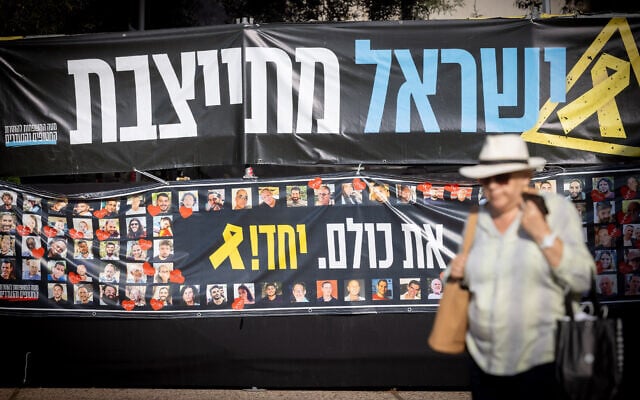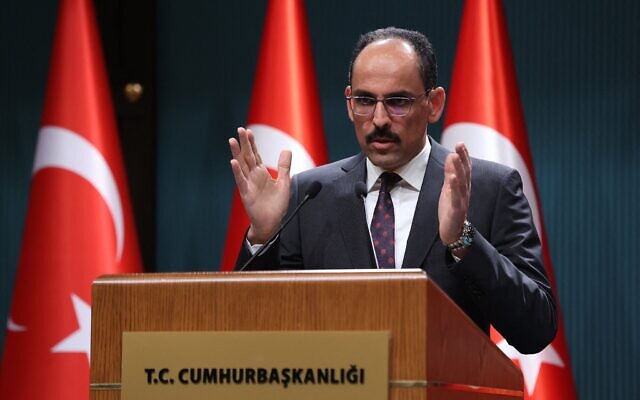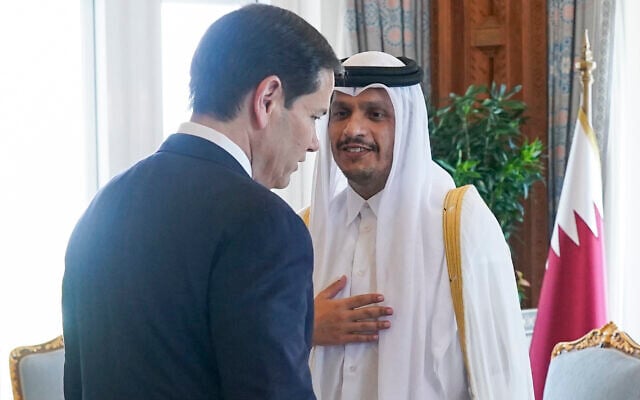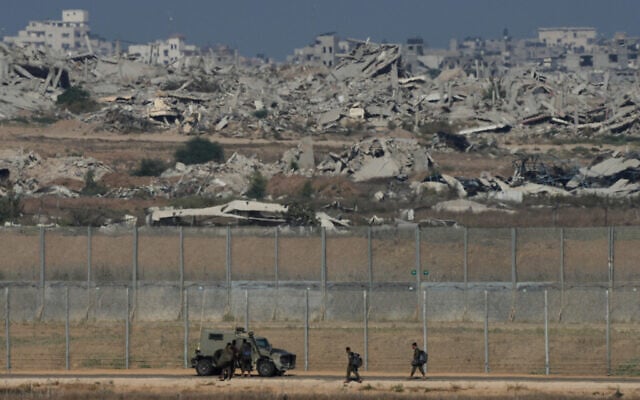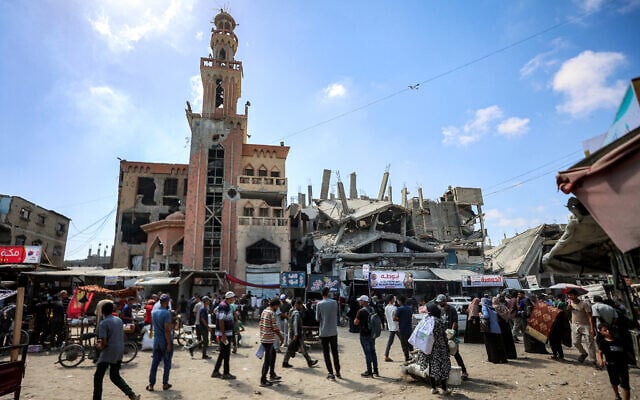

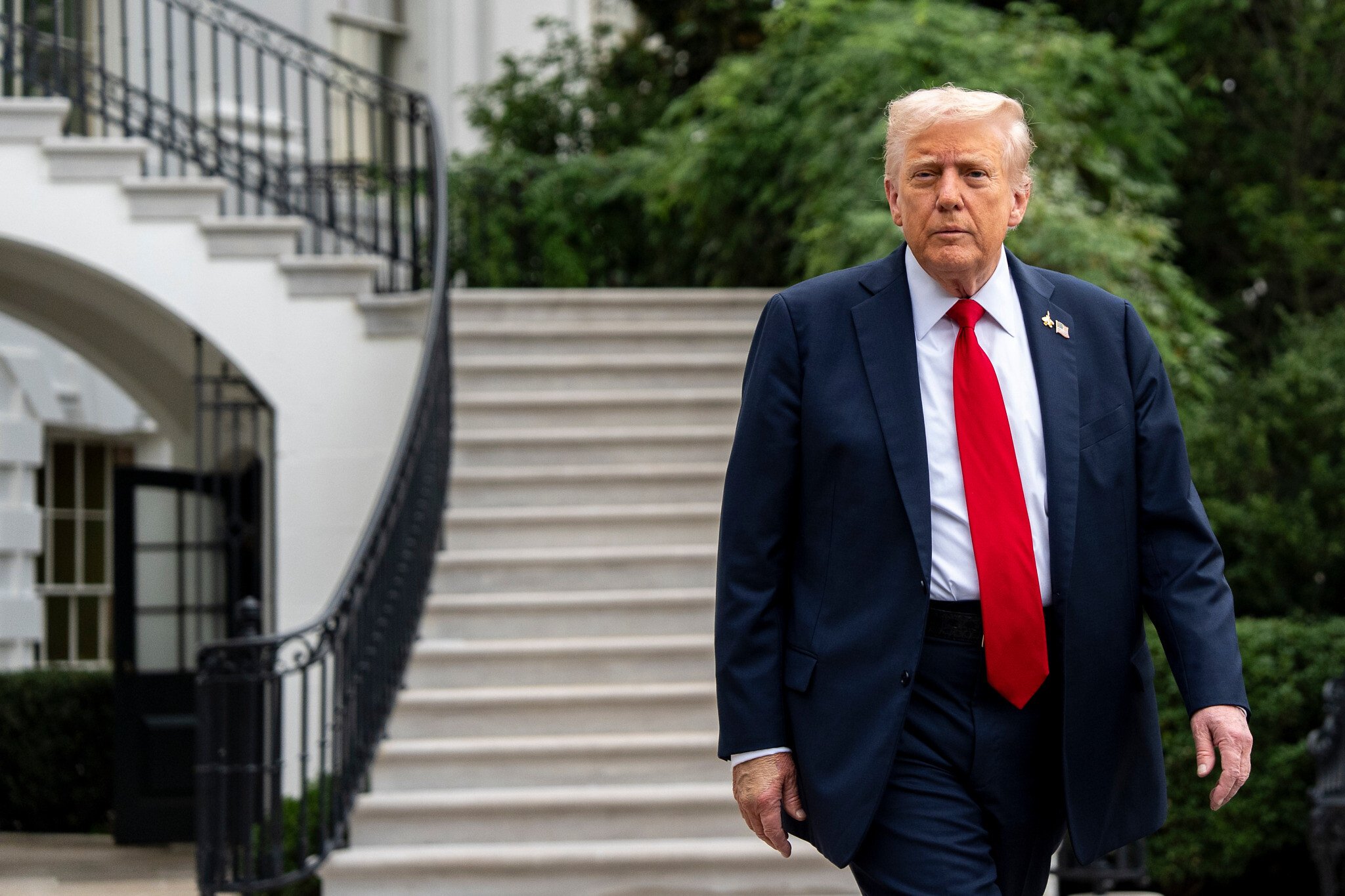
US President Donald Trump said Tuesday he will give Hamas “three or four days” to agree to his Gaza peace plan, “or pay in hell,” as the terror group faces heavy pressure from the Arab world to accept the proposal.
A day after unveiling the proposal alongside Prime Minister Benjamin Netanyahu, Trump told reporters as he departed the White House that Israeli and Arab leaders have accepted the plan and “we’re just waiting for Hamas.”
He said the terror group has about “three or four days” to respond. “Hamas is either going to be doing it or not, and if it’s not, it’s going to be a very sad end.”
Asked if there is room for negotiations on the peace plan, Trump said: “Not much.”
“We have one signature that we need, and that signature will pay in hell if they don’t sign. I hope they sign for their own good and create something really great,” Trump later told US generals and admirals in Quantico, Virginia.
The 20-point plan, unveiled at the White House on Monday, would see all 48 hostages — roughly 20 of whom are believed to be alive — released within 72 hours, and the Strip demilitarized and handed over to a transitional, “technocratic” government. Hamas members who give up their arms would be granted amnesty.
In exchange, Israel will release 250 prisoners serving life sentences; 1,700 Gazans detained after October 7, including all women and children; and 15 bodies of deceased Gazans for every body of an Israeli hostage released.
Aid will then flow into the war-torn enclave, and a process of demilitarizing, de-radicalizing, and redeveloping the Strip will begin.
A transitional government of Palestinian technocrats will be established, alongside an international advisory board chaired by Trump and including former UK prime minister Tony Blair. A temporary international security force (ISF) will be deployed to the Strip, which will gradually take over from the IDF as it withdraws.
Meanwhile, the Palestinian Authority will undergo long-demanded reforms until it is determined that the conditions are in place for a “credible pathway to Palestinian self-determination and statehood.”
The plan does not provide a timeline for this, choosing instead to leave it open-ended.
Netanyahu said he accepted the plan and has since defended it against criticism from the right — vowing not to allow the establishment of a Palestinian state or to fully withdraw Israeli troops from Gaza.
Hamas, which is reportedly leaning toward accepting the deal and will give its response to mediators on Wednesday, faces considerable pressure to approve the plan, with the foreign ministers of Saudi Arabia, Jordan, the United Arab Emirates, Indonesia, Pakistan, Turkey, Qatar, and Egypt all welcoming the initiative.
Turkey’s intelligence chief Ibrahim Kalin was sent to Doha by President Recep Tayyip Erdogan to participate in talks on Tuesday with Hamas over the proposal, according to Turkish state media.
The presence of Kalin, a close confidant of Erdoğan, marks a more public step in Ankara’s mediation role over the past two years, and follows multiple successful meetings between Erdoğan and Trump.
Kalin has previously held talks at home with Hamas leaders on Gaza-related issues.
Qatar announced it would hold discussions with Hamas negotiators and Turkey on Tuesday to discuss the proposal.
Qatari Prime Minister Mohammed bin Abdulrahman bin Jassim Al Thani told the Al Jazeera channel on Tuesday that Israel’s withdrawal from Gaza, as described in the plan, required “clarification and discussion.” He added, however, that ending the war is “a clear clause in the plan.”
He also said that the future, postwar governance of Gaza is mentioned in the plan, and will be a matter for discussion with the Americans, but “has nothing to do with Israel.”
“The plan is in its early stages and needs development. We are trying to create a path that safeguards Palestinian rights,” he added.
According to a spokesman for United Nations Secretary-General Antonio Guterres, he said Tuesday that “it is now crucial that all parties commit to an agreement and its implementation… He once again reiterates his call for an immediate and permanent ceasefire.”
The plan has stirred opposition among other Palestinian terror groups.
Abu Ali Hassan, a senior member of the Popular Front for the Liberation of Palestine, told the Sand news agency that “Trump’s plan is a recipe for managing the war and prolonging it, not for its end.”
The PFLP is one of the smaller terror organizations in the Gaza Strip, and during the war, it has been cooperating with Hamas.
Hassan added that it is “a desperate attempt to separate Gaza from the Palestinian territorial entity.”
The Palestinian Islamic Jihad terror group, which is still holding at least one hostage in the Gaza Strip, said in a scathing statement Monday night that Trump’s plan would fuel further aggression against Palestinians.
Many Palestinians in the decimated coastal enclave are also wary of the proposal. Notably, the plan sets no clear path to Palestinian statehood, which is fiercely opposed by Netanyahu’s government, and brings a so-called “Board of Peace,” headed by Trump and Blair, to supervise the administration of Gaza.
To some, that smacked of the colonial British Mandate over Palestine from 1920 to 1948.
“They want to impose their own peace,” Umm Mohammed, a history teacher who sheltered with her family in Gaza City, told The Associated Press. “In fact, this is not a peace plan. It’s a surrender plan. It returns us to times of colonialism.”
Mahmoud Abu Baker, a displaced Palestinian from Rafah, said the proposal favors Israel and implements all its demands without giving concessions.
“(The proposal) tells that we, as Palestinians, as Arabs, are not qualified to rule ourselves and that they, the white people, will rule us,” he said.
In the West Bank, some Palestinians accused Netanyahu and Trump of attempting to solve the issue without any input from people on the ground in Gaza.
“It turned into a joke. They acted like they own the whole world, deciding, analyzing, and dividing things however they want,” said Mohammad Shahin, a Nablus resident.
Israelis visiting a memorial for the music festival where 364 people were murdered during the Hamas massacre on October 7, 2023, expressed skepticism that the proposal would end the war.
Amit Zander, whose daughter Noa Zander was killed at the festival, said Trump was the only one with enough power to make a deal happen.
“Everyone pins their hopes on (Trump) … it’s up to Hamas. Israel wants it, and beyond that, it’s no longer in our hands,” he said.
“It’s definitely an effort to change something, but there have been efforts the whole time during this whole war, and change hasn’t really happened, so I think it’s all up in the air,” said Adi Nissim, who was also visiting the memorial on Tuesday.
Agencies and Times of Israel staff contributed to this report.


